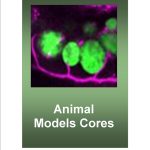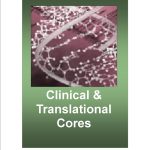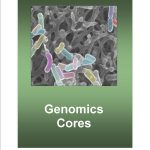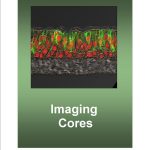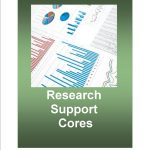UNC Animal Model Core Facilities and Resources
Contents
These pages list our core facilities by areas of focus. These are brief profiles of the cores; to find more detailed information on each core, including location, contact information, and equipment lists, please check out their facility overview in their listing in our searchable database.
Animal Models Cores provide numerous state-of-the-art approaches to utilize small animals as models for human disease. Model systems include human and mouse ES cells, iPS cells, zebrafish, Xenopus, and rodents (mouse, rat). Collectively, these cores (a) assist UNC investigators with the design, generation and genotyping of new genetically modified stem cell/small animal models (b) provide advice, assistance, and services for high-quality functional phenotyping of mice and rats (specialized Cores are available to evaluate tumorigenicity, perform pharmacodynamic assessments, assess metabolism and energy balance, analyze cardiovascular function and to monitor behavior and neurological functions) (c) perform sophisticated non-invasive imaging (echocardiography, laser doppler imaging, MRI, PET, CT) and (d) provide histological services to evaluate disease-related changes at the cellular level.
Gene Targeting
Animal Models Core
Animal Models Core (Transgenic and knockout mice and rats) provides mouse and rat genetic modification services, reagents and related technologies such as strain rederivation and cryopreservation. Services are available to UNC and external investigators. Knockout, knock-in and conditional knockout mice are created by gene targeting in ES cells with vectors produced by the Core or provided by the client (including vectors from KOMP/EUCOMM). The Core can also provide validation and mouse production using ES cells available from knockout consortia such as KOMP and EUCOMM. Transgenic mice and rats are produced by pronuclear injection of plasmid or BAC transgenes. Transgene cloning and BAC recombineering services are available upon request. Clients should contact the core director for information on DNA preparation for pronuclear injection. Mutant rats and mice can also be produced by pronuclear injection of Zinc Finger or TAL Effector Nucleases (ZFN’s or TALEN’s).
Mouse Models
Animal Models Core
Animal Models Core (Transgenic and knockout mice and rats) provides mouse and rat genetic modification services, reagents and related technologies such as strain rederivation and cryopreservation. Services are available to UNC and external investigators. Knockout, knock-in and conditional knockout mice are created by gene targeting in ES cells with vectors produced by the Core or provided by the client (including vectors from KOMP/EUCOMM). The Core can also provide validation and mouse production using ES cells available from knockout consortia such as KOMP and EUCOMM. Transgenic mice and rats are produced by pronuclear injection of plasmid or BAC transgenes. Transgene cloning and BAC recombineering services are available upon request. Clients should contact the core director for information on DNA preparation for pronuclear injection. Mutant rats and mice can also be produced by pronuclear injection of Zinc Finger or TAL Effector Nucleases (ZFN’s or TALEN’s).
Animal Studies Core
Animal Studies Core (ASC) maintains immunodeficient mouse strains for xenograft models and manages investigator colonies of GEMM mice for syngeneic models. We provide both injection models as well as orthotopic surgeries to target organs of interest. Our mission is to support research efforts of LCCC and other UNC Investigators.
Gnotobiotic Core
Gnotobiotic Core (Center for Gastrointestinal Biology and Disease)
The Gnotobiotic Core at The University of North Carolina at Chapel Hill maintains several inbred and outbred strains of germ-free and gnotobiotic rodents. The mission is to support animal model and basic research projects of CGIBD investigators and of scientists nationwide. Mice and rats can be purchased and shipped to investigators or experiments can be carried out in our facility.
Mutant Mouse Regional Resource Center
Mutant Mouse Regional Resource Center acts as a repository for mutant strains of mice. The MMRRC UNC center is one of four collaborating centers functioning as a single, multi-site repository and informatics center for mouse lines of interest for the research community.
The centers accept strain submissions after review by a strain selection committee. The accepted strains are cryopreserved and made available worldwide, on demand, from the cryoarchive. Breeding colonies of high demand strains are established to fulfill orders.
Rodent Breeding Colony Management Core
Rodent Breeding Colony Management Core (CMC) was founded with a mission to support UNC faculty with their mouse and rat breeding needs. Our service saves researchers time, money, and covers all aspects of managing given mouse or rat colonies. No colony is too small or simple; no colony is too large or complex. We are experienced with many genetic configurations and assist in establishing the most efficient, time- and cost-effective way to breed for specific research needs. Access to a custom created shareable online database, provides us with an effective communication tool and assists with proper colony pedigree tracing . We strive to improve weaning outcomes of harder to maintain mutant strains, reduce animal stress and overproduction, and allow laboratory personnel to focus more on research related duties. The core staff consists of experienced AALAS-credentialed breeding specialists, a PhD-level manager, advanced manager for operations support, and an attending veterinarian faculty advisor. We currently support over 30 colonies of various sizes and steadily growing while simultaneously maintaining high expectations of the UNC community with our exemplary service.
UNC Systems Genetics Core
UNC Systems Genetics Core: The core provides Collaborative Cross mice and genotypes to investigators both at UNC Chapel Hill and at other institutions.
The Collaborative Cross (CC) is a large panel of recently established recombinant inbred (RI) mouse lines specifically designed to overcome the limitations of existing genetic resources and to act as an optimal murine model of heterogeneous human populations.
The goal of the program is to conduct research that results (i) in determining the function of many of the genes identified by the human genome program, (ii) in providing mouse models for genetic diseases, and (iii) makes populations of mice that mimic the human population for elucidation of Quantitative Trait Loci (QTLs).
Rodent Phenotyping
Animal Studies Core
The Animal Studies Core provides a central facility staffed by skilled technicians to promote reproducible experimentation in laboratory animals for UNC investigators.
Services include small animal injection and surgical models, colony management, optical imaging, traditional theraputic and gene therapy approaches, tumor transplantation and tumorigenicity testing, pharmacologic and pharmacodynamic assessment, experimental design and protocol assistance, and production of nu/nu and SCID mice.
Cardiovascular Physiology and Phenotyping Core
Cardiovascular Physiology and Phenotyping Core provides technology, surgical skills and knowledge necessary for developing and applying preclinical mouse models that may prove to be of value in the study of human cardiovascular and other diseases. Services include: Surgical and non-surgical preclinical cardiovascular mouse models (e.g. aortic banding, myocardial infarct and hind limb ischemia moels, femoral or carotid artery injury, arterial and venous transplant, vascular access, inferior vena cava banding, etc.), Cardiovascular Phenotyping (invasive and non-invasive blood pressure measurement, small animal echocardiography, laser doppler measurements, ECG monitoring, etc.), Intravital Microscopy (Leukocyte rolling and adhesion, cell interactions, etc.), Tumor Screening.
Mouse Behavioral Phenotyping Laboratory
Mouse Behavioral Phenotyping Laboratory provides investigators within the Carolina Institiute for Developmental Disablities and throughout the University of North Carolina research community with a wide variety of mouse behavioral tasks to analyze targeted gene mutations relevant to basic research and models of human diseases, inbred strains, pharmacological treatments, gene therapies, etc.
Initial testing includes a standardized battery for measures of general health, home cage behavior, and neurological reflexes. Sensory abilities and motor functions are evaluated with a sequence of simple tasks. Multiple tests are available to evaluate mice in specific behavioral domains, including social interaction, learning and memory, and prepulse inhibition.
Nutrition Obesity Research Center (NORC) Animal Metabolism Phenotyping Core
The Nutrition Obesity Research Center (NORC) Animal Metabolism Phenotyping Core provides access to state of the art phenotyping techniques for metabolism and energy balance in mouse models of nutrition and disease. Those phenotypes are: body composition, home cage activity, energy expenditure, food/drink consumption and behavior, voluntary/endurance exercise capacity, bone mineral density and microbiome analysis.
Pathology Service Core
The Pathology Service Core’s clinical chemistry component assists research investigators who would greatly benefit from availability of service (on a cost-per-test basis) that replicates for animals the laboratory tests that are routine for humans. Examples include blood chemistry, urinalysis, hematology, and biomarker Immunoassay.
Animal Histology
Histology Research Core Facility
The Histology Research Core Facility serves the histology needs of the UNC community and beyond.
We have experience with various organisms including, but not limited to mouse, rat, pig, cat, dog, fish, human and primate. Additionally, we have provided histology services for plants and invertebrates such as coral, caterpillars and even stinkbugs!
Research applications: We take pride in providing top quality paraffin and frozen sectioning, special staining, and both fluorescent and chromogenic single- and multi-label immunohistochemistry. Furthermore, we recently added in situ hybridization using RNAscope and BaseScope technology to our list of services. Our lab houses an extensive slide catalogue for our customer’s use as positive and negative controls, provides access to HIER for antigen retrieval in conjunction with our IHC/IF services, and offers the CryoJane Tape Transfer system to improve morphology during frozen sectioning.
We offer all services at competitive rates with a quick turn-around time of typically within 2 weeks of sample submission. We are here to talk with you at any stage in the research process about your specific research aims and the best way to achieve the results you need.
Please explore our new website where you can find detailed information about all of our services, submission instructions, answers to frequently asked questions and more.
We are located in rooms 212, 213, 214, and 216 in Taylor Hall at 109 Mason Farm Rd Chapel Hill, NC 27514. We can be reached by phone at (919) 966-1202 or e-mail at hrc@med.unc.edu. Please contact us to discuss your specific research needs!
Instrumentation available: Leica 1950 Cryostats, LKB Rotary Microtome, LeicaRM2235 Rotary Microtome, eVos Microscope, RNAScope and HiPlex technology, CryoJane Tape Transfer System for the cryostat, Vibratome,
Eligible users: Any researchers at UNC or other academic institutions, and in industry.
Pathology Service Core
The Pathology Service Core’s animal histopathology component offers consultation and training in necropsy techniques and histopathologic assays, as well as routine histology services such as processing, embedding, sectioning an H&E and special stains.
Research applications: Major services include tissue embedding and sectioning (frozen and paraffin), routine and special stains, consultation on animal study design, tissue collection, immunohistochemistry (IHC), immunofluorescence (IF), and pathology consultation.
Instrumentation available: Leica St5010 Autostainer XL, Leica CV5030 Coverslipper, NX70 Cryostat, Leica Automated Tissue Processor, ASP6025, Fluorescence Microscope E600, Leica RM2255 Automated Microtomes, Histocore Arcadia Embedder, Ventana Discovery Ultra Stainer.
Animal Imaging
Biomedical Research Imaging Center (BRIC) Small Animal Imaging (SAI)
Biomedical Research Imaging Center (BRIC) Small Animal Imaging (SAI) provides various animal imaging services to facilitate biomedical research at UNC and beyond. Non-invasive in-vivo animal imaging provided by the core has been critical in many research fields including neurological study, cancer research, pharmaceutical development, etc. The goal of SAIF is to develop and offer advanced imaging technologies with state-of-the-art instrumentation and experienced staff to assist investigators in a wide range of applications in biomedical research. To date, the SAI core houses twelve major pieces of equipment for animal imaging, including two MRI, one MR/PET, one PET/CT, one SPECT/CT, two microCT, three optical imaging, and two ultrasound imaging systems. The facility has become the most complete animal imaging facility regional-wise. We have expertise on imaging small animals such as rats and mice, as well as bigger animals like cat and dogs. The facility is open to all users and does accept work from external entities.
Animal Studies Core
The Animal Studies Core provides a central facility staffed by skilled technicians to promote reproducible experimentation in laboratory animals for UNC investigators.
Services include small animal injection and surgical models, colony management, optical imaging, traditional therapeutic and gene therapy approaches, tumor transplantation and tumorigenicity testing, pharmacologic and pharmacodynamic assessment, experimental design and protocol assistance, and production of nu/nu and SCID mice.
Aquaculture Models
Zebrafish Aquaculture Core Facility
Zebrafish Aquaculture Core Facility provides zebrafish husbandry and training services to researchers at UNC-CH. This facility operates as an IACUC Satellite Animal Facility with veterinary care provided by DLAM.
The following services are available:
• Zebrafish embryos (several wild-type and transgenic lines available)
• Facilities for zebrafish microinjection and light stereomicroscopy
• Training for zebrafish embryo handling, microinjection, and light stereomicroscopy
Stem Cell
Animal Models Core
Animal Models Core (Transgenic and knockout mice and rats) provides mouse and rat genetic modification services, reagents and related technologies such as strain rederivation and cryopreservation. Services are available to UNC and external investigators. Knockout, knock-in and conditional knockout mice are created by gene targeting in ES cells with vectors produced by the Core or provided by the client (including vectors from KOMP/EUCOMM). The Core can also provide validation and mouse production using ES cells available from knockout consortia such as KOMP and EUCOMM. Transgenic mice and rats are produced by pronuclear injection of plasmid or BAC transgenes. Transgene cloning and BAC recombineering services are available upon request. Clients should contact the core director for information on DNA preparation for pronuclear injection. Mutant rats and mice can also be produced by pronuclear injection of Zinc Finger or TAL Effector Nucleases (ZFN’s or TALEN’s).
Human Pluripotent Cell Core Facility
The Human Pluripotent Cell Core Facility provides UNC scientists and outside collaborators with services to successfully conduct basic as well as translational research using human embryonic stem (hES) cells and human induced pluripotent stem (hiPS) cells.
Types of Services & Support Available:
1. Reprogramming human somatic cells to induced pluripotent stem cells
We are using the latest protocols to generate, clonally expand and characterize human induced pluripotent stem (hiPS) cells from a variety of tissue-type fibroblasts. We generate iPS cells using lentiviral transduction and feeder-free conditions and perform quality control experiments to verify the pluripotency of the iPS cells. We are also working on reprogramming peripheral blood cells as well as keratinocytes.
2. Expanding human embryonic stem cell lines
We use the most current protocols to maintain and expand hES cell lines under feeder-free conditions on substrates such as matrigel or fibronectin. For researchers that have purchased human embryonic stem cell lines but do not have the expertise in manipulating these cells, we can thaw, validate, expand and cryopreserve them.
3. Differentiation studies using both hES as well as hiPS cells
We are using current protocols as well as generating new ones to differentiate hES and hiPS cells into a variety of cell types (neuronal progenitor cells, endothelial cells, retinal progenitor cells as well as cardiomyocytes). We are optimizing protocols for hES/hiPS differentiation into mesenchymal, hepatocyte as well as other cell types.
